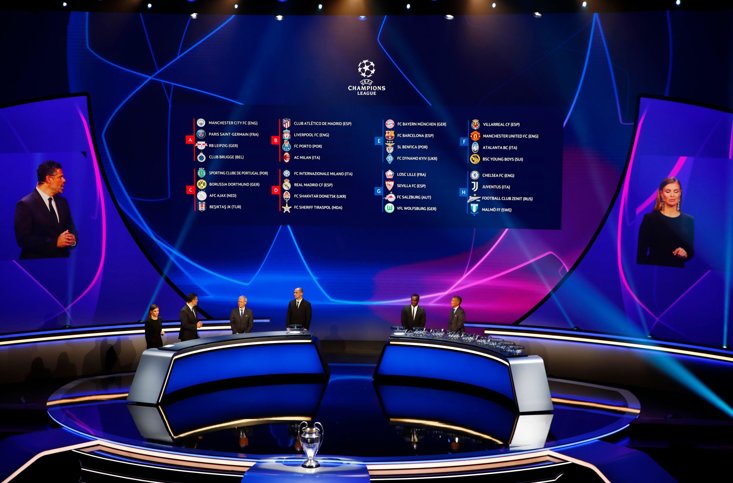The 2021-22 edition of the Uefa Champions League gets underway on Tuesday, with its annual feast of great anticipation turning quickly into inevitable qualifications for most of the big names. In response to the detractors of the current format, Uefa has come up with a new setup beginning in 2024-25.
But what does the new format look like, how will it work, and will it really be any better than what we have right now?
Here, your burning questions are answered.
What is it?
The 32-team group stage will be scrapped and instead there will be a single league consisting of 36 clubs who will each play 10 fixtures – five home and five away, against 10 different sides. Uefa has remained tight-lipped over how the 10 opponents will be selected for each of the 36 participants, with more details due to be revealed nearer the end of 2021.
There will still be three points awarded to winners of each match and one for a draw, and knockout stages will remain from the round of 16 onwards. There will, though, be an extra play-off round prior to the last 16.
More on that later!

When does it come into effect?
The debut season for the new-look tournament will be the 2024-25 season, with clubs having the next three years to jostle for position in the Uefa co-efficients to get themselves well placed to be a part of it.
Why? Well…
Who qualifies?
The qualification format will largely remain the same as it currently is for the Champions League but of course there will now be an extra four places up for grabs. Uefa has explained these slots will be assigned for the following:
First, the national association in fifth spot in the Uefa rankings get an extra place, so right now the third-placed team in France would qualify automatically instead of needing to qualify.
For the second spot, an extra avenue will be opened up on the ‘Champions Path’ of qualifying, meaning there will be five rather than four national league winners entering through qualifying. That’s good news for champions in the likes of Scotland, Azerbaijan and Romania.
The remaining two slots? Well, they go to the two clubs with the highest Uefa co-efficients who have otherwise failed to qualify automatically for the league stage but have made it to a European trophy of some description that season.
Who reaches the last 16?
The top eight teams at the conclusion of each side’s 10 fixtures will automatically qualify for the round of 16. The clubs that finish between ninth and 24th enter a play-off round to reach the last 16, with teams finishing ninth to 16th getting home advantage in the second leg.
The eight clubs who triumph in the play-offs will then face one of the top-eight finishers in the round of 16.
Everything you need to know about the changes 👇
#UCL
Why has Uefa done this?
Firstly, let’s not discount that the main decision for the change to the format wasn’t a financial one. The Champions League is a cash cow and Uefa is trying to generate as much money from it as possible. The current group stage has a total of 96 games and the new changes will almost double the total to 180 games.
This will allow for an even bigger TV deal and it could cause a frenzy amongst broadcasters if the rights for the jaw-dropping number of games could be shared. The current deal for the competition cost BT Sport a whopping £1.2 billion and there is no doubt that the new changes will be brought in to increase the price tag.
Uefa has said that it believes it will give the opportunity for clubs to test themselves against a wider range of opponents while also adding excitement earlier in the competition. What it has not considered is that there is sure to be some terrible fixtures in there which will be a dead rubber if, for example, 25th play against 31st.
UEFA president Aleksander Ceferin said: “This evolved format will still keep alive the dream of any team in Europe to participate in the Uefa Champions League thanks to results obtained on the pitch and it will be enable long-term viability, prosperity, and growth for everyone in European football, not just a tiny, self-selected cartel.”
Will the group stage finish by Christmas?
Uefa is yet to disclose all the finer details regarding the new changes but it would be fair to assume that the aim will be to have the league fixtures completed before Christmas. With sides playing four extra games compared to the current format, alongside domestic fixtures, it could prove to be a struggle.
What does this mean for domestic competitions?
It does not bode well for the League Cup, to say the least. A competition that is already being undermined by the top sides in the Premier League in the earlier rounds is sure to only get worse. It may force the EFL to restructure the calendar for when the matches are played as the teams that qualify for the new-look Champions League will only complain more about the congestion of fixtures.
These changes are sure to divide opinion and a lot of people will not like the dramatic change to the group stage format even though the current format is far from perfect. For a lot of supporters, it may well be the case of you don’t know what you have until it’s gone. Make the most of what you have now and enjoy these last few years before all hell breaks loose in the Champions League.
